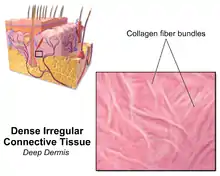Dense irregular connective tissue
Dense irregular connective tissue has fibers that are not arranged in parallel bundles as in dense regular connective tissue.

Dense irregular connective tissue consists of mostly collagen fibers. It has less ground substance than loose connective tissue.[1] Fibroblasts are the predominant cell type, scattered sparsely across the tissue.[2]
Function
This type of connective tissue is found mostly in the reticular layer (or deep layer) of the dermis.[3] It is also in the sclera and in the deeper skin layers. Due to high portions of collagenous fibers, dense irregular connective tissue provides strength, making the skin resistant to tearing by stretching forces from different directions.[4]
Dense irregular connective tissue also makes up submucosa of the digestive tract, fibrous capsules of joints and lymph nodes, and some types of fascia.[5] Other examples include periosteum and perichondrium of bones, and the tunica albuginea of testis. In the submucosa layer, the fiber bundles course in varying planes allowing the organ to resist excessive stretching and distension.
References
- Mescher, Anthony L. (2013). Junqueira's basic histology : text & atlas (13th [rev.] ed.). New York [etc.]: McGraw-Hill Medical. ISBN 978-0-07-180798-2.
- "Connective Tissue". Archived from the original on 2008-11-07. Retrieved 2008-11-27.
- http://www.pc.ctc.edu/hart/ctprop/dirr.html
- Pawlina, Wojciech (2016). Histology: A Text and Atlas: With Correlated Cell and Molecular Biology 7th Edition. China: J. B. Lippincott. pp. 158–159. ISBN 978-1451187427.
- "Archived copy". Archived from the original on 2009-09-23. Retrieved 2009-10-17.CS1 maint: archived copy as title (link)